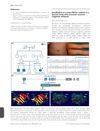Search
forLearn
4 / 4 resultslearn Melatonin
hormone commonly taken for sleep aid has some topical benefits for hair
learn Stem Cell Factor
learn Neem Oil
natural substance from Neem tree with medicinal and pesticidal properties
Research
5 / 1000+ results
research Inherited Ichthyosis: Syndromic Forms
Understanding the genetics of rare inherited ichthyosis syndromes is key for better treatments and genetic counseling.
research Genetics of Inherited Ichthyoses and Related Diseases
New genetic variants linked to inherited ichthyoses were identified, offering insights for potential gene therapy.

research Disorders of Keratinization
The chapter explains that there are many genetic skin disorders affecting skin cell formation, including both common and rare types.

research Identification of a Novel PNPLA1 Mutation in a Spanish Family with Autosomal Recessive Congenital Ichthyosis
A new gene mutation linked to a skin condition was found in a Spanish family.

research Sebaceous Carcinoma Arising at a Chronic Candidiasis Skin Lesion of a Patient with Keratitis-Ichthyosis-Deafness (KID) Syndrome
A man with KID syndrome developed a rare cancer in a long-term skin infection.
Community Join
5 / 243 resultscommunity Compared to the hair of your father at your age how is your hair doing?
How people's hair is compared to their fathers' at the same age, with some users noting that they have inherited different genes from either parent and are using treatments such as finasteride for hair loss.
community Clascoterone - what we have right now
Clascoterone is a topical treatment for androgenetic alopecia, showing modest to moderate hair regrowth, and may be available by 2027-2028. It is considered safer than finasteride, with discussions on its effectiveness compared to RU58841 and pyrilutamide.

community 21M Concerned About Temple Recession: Minoxidil/Finasteride Worth It?
A 21-year-old is experiencing hair loss and is considering using Minoxidil and Finasteride, but is concerned about lifelong dependency and seeks advice on permanent solutions. They are advised to act quickly, consider additional treatments like Dutasteride, and get blood tests to rule out other causes.
community Where to buy Latanaprost or equivalent?
The conversation discusses using Latanoprost for hair regrowth, with the original poster seeking advice on where to purchase it without a prescription. Users suggest alternatives like Triple Hair's TH-07, which includes Finasteride, Minoxidil, and Latanoprost, and Strut's Latanoprost with melatonin and caffeine.
community Finasteride 1mg every day 3 year update. Hairloss stopped, mild regrowth, very happy with results.
The user is happy with the results of using 1mg finasteride daily for three years, reporting stopped hair loss and mild regrowth without side effects. They avoid minoxidil due to concerns about application and potential risks, and they use 2% nizoral shampoo weekly.